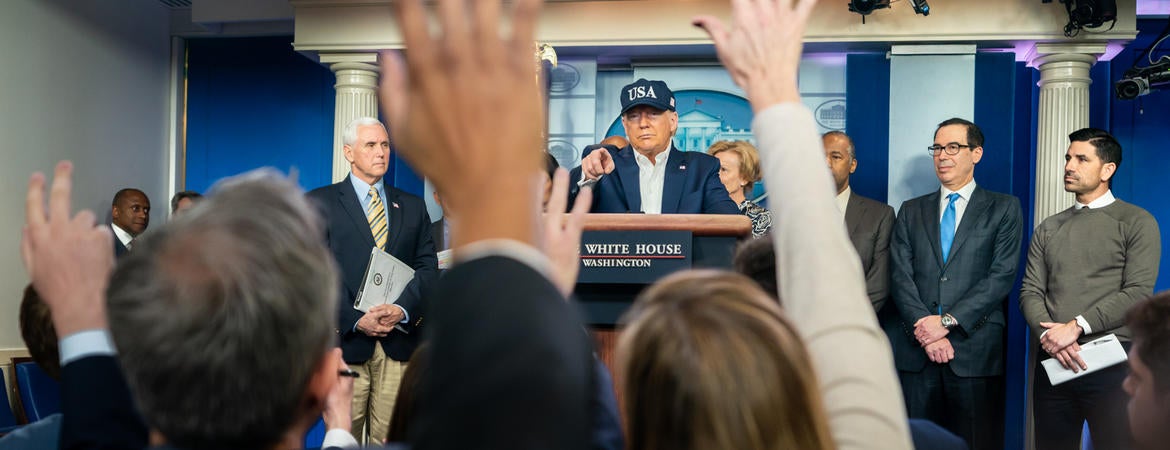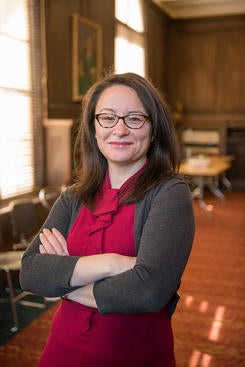
As a graduate student, Kim Yi Dionne wanted to do research that mattered. For Dionne, now an expert in African politics, that meant studying what was once the leading cause of death for people in Africa: HIV/AIDS.
“I thought whatever movement we could make toward better understanding what works in response to HIV/AIDS, and what governments can do to stem the tide of the pandemic, was something we should be studying,” said Dionne, who is an assistant professor of political science at the University of California, Riverside.
Since then, Dionne has studied several other disease outbreaks, including the West African Ebola epidemic of 2014-2016, tracking different responses to those outbreaks by governments and the general public alike. Here’s what she wants you to know about responses to the spread of COVID-19, and what sets this outbreak apart from others that came before it.
As someone who has studied disease outbreaks, what are you finding most fascinating about COVID-19 and how people are responding to it? I think it’s really interesting seeing how different governments are responding to this pandemic. Even just here within the United States, different local governments, state governments, and of course our federal government have had varied responses when it comes to how to deal with this. I think we can learn from earlier outbreaks about the kinds of responses that are helpful and those that aren’t, and yet in seeing the ways people are responding to this, it’s reminding me that not everyone learns from history. We need to pay a bit more attention to comparing how governments are responding to this pandemic and protecting their citizens from getting sick.
Any insight you can share about how current responses to COVID-19 compare to past responses to disease outbreaks? Well, very early on in this outbreak, there were calls, for example, to limit international travel. Governments have a long history of responding to disease outbreaks by curtailing travel — and particularly the movement of noncitizens — to their countries. I did research on the Ebola outbreak in West Africa in 2014 to 2016, and back then there was a big controversy about whether there should be a travel ban to the United States from the affected countries.
If we look at the West African Ebola outbreaks, governments also had people shelter in place and quarantine themselves even when they weren’t known to be infected as a way to curb the spread, and there were changes in burial practices. We’re seeing some of those same strategies be used now to prevent further spread and protect public health.
What has your research told you about government strategies that have worked to curb disease spread? One thing I’ve learned is that you have to consider the perspectives of citizens. What do they think is important? And whom do they listen to? Whom do they trust? We’re still quite early in this pandemic here in the United States, but people in China and Hong Kong and South Korea have been dealing with this for a while, so those are places we should be looking at to better understand what worked at the citizen level as far as making people change their minds and think this is a serious problem.
In your research, you’ve also looked at why certain people and groups are “othered” or blamed for diseases by being associated with those diseases in the public imagination — something that’s happened recently with Chinese people and the coronavirus. What are the consequences of such behavior? You know, I had 10 minutes to stop by my office today and grab whatever I could. And I grabbed two books, one of which was “Boundaries of Blackness” by Cathy Cohen, who is a political scientist at the University of Chicago. She wrote about the AIDS epidemic here in the United States, and particularly how it was framed and how it affected black Americans. We had a disease that was highly stigmatized in the United States and mainly identified with marginalized groups.
What Cathy Cohen was trying to say is that because AIDS was such a stigmatized disease, and because people mainly associated it with marginalized groups, it led people to not have meaningful responses to the disease in ways that protected their own communities. One thing I’ve learned in studying AIDS is that diseases that are “othered,” or those that people try to assign to a specific group, are quite dangerous. They’re especially dangerous because it’s very hard to get governments to have a robust response when the public imagination sees a disease as being specific to certain groups — and marginalized groups, in particular. So, in short, it’s bad for response.
But it’s not just about a limited state response, which is really terrible when you need governments to respond quickly and effectively; it’s also bad for how individuals manage their own behaviors. If a disease is associated in the public imagination with a stigmatized or marginalized group, and you are not part of that stigmatized or marginalized group, you may not engage in protective behaviors. In the case of COVID-19, if you think this is a “Chinese virus,” then you as a white person may not take seriously the need for social distancing or the need to wash your hands vigorously. You may engage in activities that put you at risk because you don’t associate you and your group as being at risk, even though the disease doesn’t discriminate.
Can you speculate as to why people are so quick to turn such narratives? I can make a few conjectures based on the research I’ve done. People are scared, and when people are anxious about something like a disease — especially if they start to feel like they’re vulnerable to it — it makes them more likely to associate it with stigmatized or marginalized groups.
If anything, I think there’s a great opportunity here for us to learn from the Chinese experience when it comes to what to do in response to this pandemic. But if we engage in the kind of rhetoric where we’re blaming “the Chinese,” that might make them less likely to help us.
What do you think sets COVID-19 apart from earlier epidemics or pandemics you’ve studied? One thing that’s hard about this particular pandemic is that we can’t get people in the streets to mobilize for better policy response. It was really important and pivotal in the fight against AIDS that activist organizations Act Up here in the United States and Treatment Action Campaign in South Africa, for example, took to the streets and advocated for more and better care. But we can’t do that with this pandemic because doing so would put people at risk of getting infected. So, now the question is: How do you mobilize people without physical connection? That’s one of the things that makes this disease outbreak exceptional.




